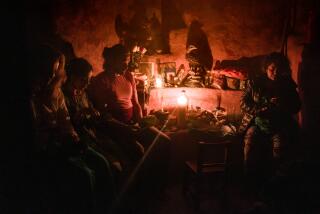Spicy Solution to the Afghan Poppy Problem
- Share via
HERAT, Afghanistan — The Romans used it to scent their baths, and ounce for ounce it was worth its weight in gold. Now, saffron, the most expensive spice in the world, could be the answer to Afghanistan’s growing opium problem.
About 400 farmers in the western province of Herat are part of a local project to grow saffron instead of the poppies used to produce opiate drugs. If successful, the switch might put a dent into an industry that supplies more than 75% of the world’s heroin.
“Saffron is slowly improving our lives, and it is not difficult work,” said Abdul Samed, a former poppy farmer who is waiting to harvest an acre of saffron next autumn. He added: “Our country is getting better every day. I know farmers here who are growing poppy. But I am trying to encourage them to grow saffron. It is legal. If I make a profit I will share it with other neighbors so they see how good it can be.”
Saffron cultivation is one possibility being examined by a team of three British advisors sent to help find solutions to the drug problem. Britain will spend $126 million in the next three years to fight illegal drug production in Afghanistan. The United States has pledged $40 million to $50 million more. The money will pay for crop eradication.
So far, every anti-drug effort has failed. At first, farmers were bribed into not growing poppies, but most took the government’s money and grew the plants anyway. Last year, President Hamid Karzai delegated anti-drug efforts to the provincial governors, but the ban was enforced selectively and marred by favoritism.
Meanwhile, the problem is getting more severe. Poppy production is expected to set a record this year after doubling last year from 2002. Under the Taliban, production had been sharply curtailed.
So the agriculture department in Herat took matters into its own hands. Last year, Afghan officials brought back saffron bulbs from Iran, potentially a major market.
“Saffron was chosen because it needs less water and irrigation than wheat,” said Ziauddin Shakebany, the deputy agricultural minister. “It is getting better day by day and more people know about it now.”
Mullah Akbar embraced the idea enthusiastically -- partly because, he admitted, the powerful warlord and governor of Herat, Ismail Khan, had warned farmers not to grow poppy anymore or risk arrest. Akbar can earn about $170 for 2.2 pounds of saffron, about half what he could earn from the same amount of poppy. But the yield for saffron is better than that of wheat -- 10 pounds of wheat earns him about $2.
The exotic spice is the stigma of the saffron crocus. The blossoms are plucked and laid out to dry for three days. The reddish-gold threads, about an inch long, are then pulled out of its center. Saffron is valued for its peppery, honeyed fragrance. “I use it myself for tea and in rice,” Akbar said.
An American official speaking on condition of anonymity expressed skepticism of the saffron solution.
“There is no crop on Earth that can replace poppy,” he said. “There is nothing wrong with saffron, but it will never replace poppy because of its cost.”
Most Afghan-grown heroin ends up in Western Europe, while South America provides the plants for the drugs used in the United States. However, the U.S. needs an Afghan solution because the drug trade funds terrorist organizations such as Hezb-i-Islami, led by the warlord Gulbuddin Hekmatyar.
“They are a narco-military terrorist organization,” the U.S. official said. “In fact, they are a drug cartel which has insurgency goals against the Karzai government.”
Hezb-i-Islami is believed to ship approximately $120 million in cash a year to Chechnya and Islamic fundamentalist groups in Uzbekistan. It was responsible for an estimated 10% to 15% of last year’s opium crop. The government should make it clear to farmers that they will face prosecution if they continue to grow poppies, the official said.
“There may be a farmer who is a victim of poppy, but I have yet to see it in this country,” he said. “If they grow it because it pays more, well, that’s simple greed.”
The poppy problem is compounded by an increasing number of Pakistani “agricultural experts” traveling to Afghanistan to encourage farmers to grow poppies destined for heroin addicts in Pakistan, he added.
Mullah Akbar said he was looking forward to installing electricity in his house with the money from this year’s saffron crop.
“We have lived for so long and have never seen electricity,” he said. “Some people buy motorcycles from Iran but they run out of fuel after 10 days and don’t have the money for more. If everyone here grew saffron, our lives would be better.”
More to Read
Sign up for Essential California
The most important California stories and recommendations in your inbox every morning.
You may occasionally receive promotional content from the Los Angeles Times.













